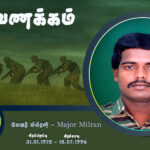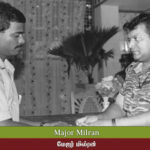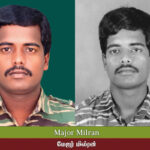

Major Milran Veerachavu 18.07.1996 Memorial Day today.
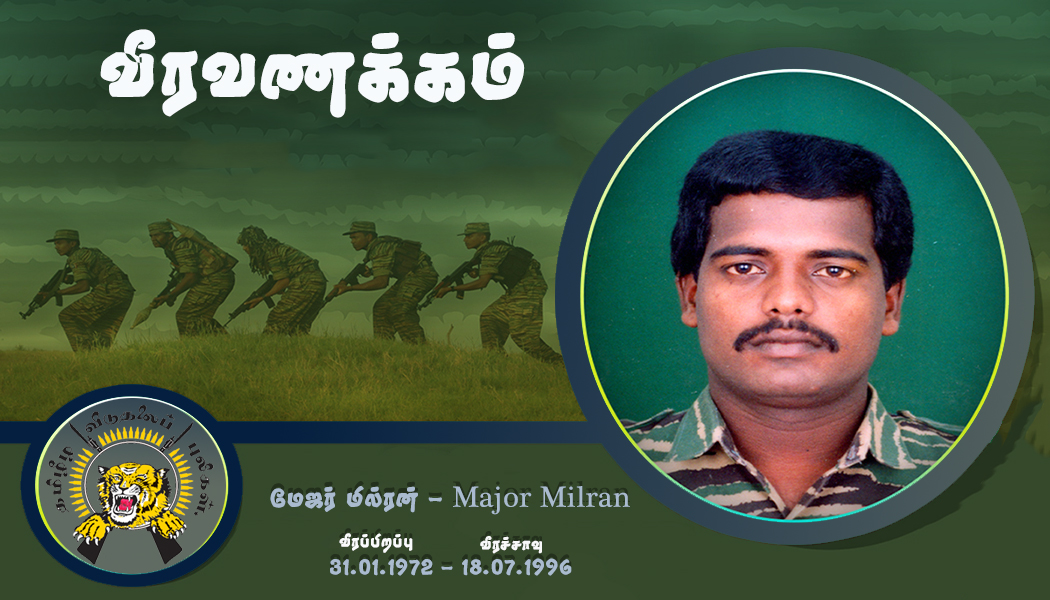
Major Milran Veerachavu 18.07.1996 Memorial Day today.
“If aththaan was alive now, I would have married him. Even now, I have married someone just like him.”
This is how his school friend Vimala remembers him.
In his mother’s words:
“He has no enemies – everyone clings to him. When he traveled from his village to Omantai school, he was the one who took care of the village girls, ensuring their safety.”
Rather than saying there was charm in his dark complexion, it was his genuine, honest, and heartfelt interactions that made him captivating. Even though the superstitions of his native village grew alongside him, the path of liberation he chose at the age of eighteen paved the way for progressive thinking. When he became a fighter, a leader, and returned home on a CD-125 motorcycle, his conversations with his still-traditional parents revolved around new ideas.
“Stop clinging to that jungle and come to the road,” he argued, which led to his home moving near A-9 Road.
Though there were initial debates, ultimately, the house followed his command. His primary order was:
“Any fighters who come home must be given tea and food before they leave. They are also your children.” This sentiment had taken root in him from the very beginning of his involvement in the movement.
By 1989, it had been a year since he joined the movement. The news that he was moving around as a leader of a unit in the Palamottai and Kondakkaraikulam regions reached his parents through relatives.
Even though they knew that their son wandering in the sights of the Indian army was not ideal, their hearts did not accept it. To the best of their ability, they searched for him in the villages where he moved, carrying small bundles of food. A few weeks later, he came to them.
“Mother, I knew you were looking for me. I thought you would give up without finding me. But now, you are standing here, determined to see me. Mother, just like me, the girls in my unit have also left their parents behind. It is not fair that you came just for me, especially when I am responsible for two units now. It doesn’t feel right, Mother.”
His few matured words filled his mother’s eyes with tears.
“Mother, I am leaving now. This small bundle of food is not enough for all of us. Next time, if you get a chance, make enough for everyone.” His mother kept watching as he disappeared into the dense jungle.
“He has gone to fight. He will finish his duty and return home,” his father said, holding her hand and leading her away.
A few months after meeting him, the mother heard from a neighbor that there was a battle between the Indian army and the girls in his unit at Kondakkaraikulam. The thought that the girls had suffered losses shattered her. Only weeks later did she receive reassuring news.
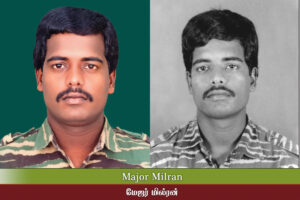 He described the incident like this:
He described the incident like this:
“We thought no one would come into the cremation ground, so we hid there. But the Indian army fired a shot with their LMG, and a piece of shrapnel broke my arm. From then on, we called them ‘Cremation Ghosts’ as our code name.”
At that time, all supplies for jungle camps came from urban areas and were transported on fighters’ backs. In an environment where even fifty kilograms of rice could cost bloodshed, his shoulders carried hundreds of sacks for his fellow fighters.
In the intense war zone, when moving into the village, the safest hiding places became their homes. At times, he had to curl his six-foot body into a four-foot space to sleep.
“My father always said, ‘A man should stretch his legs and sleep upright.’ If he saw me now, he would say, ‘A man should learn to curl up and sleep.'”
Accepting a hard, dangerous life with unwavering joy is what makes a true fighter. That is why he could lead his unit in battles against the Indian army in Mankulam, Kanagaryankulam, and Panrikeythakulam. When the Indian army was expelled from our land in the 1990s, he was one of the fighters absorbed into the intelligence wing.
When the intelligence wing took on the crucial task of eliminating traitors and ensuring the strength of the movement, he was initially assigned those duties. However, his warrior spirit led him to become a frontline commander in the intelligence combat unit.
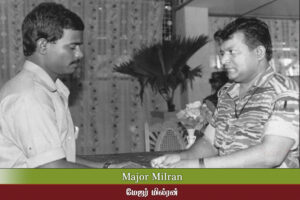 Just like Lieutenant Colonel Gopi, he was known for keeping morale high among his fighters. Even during battle, his constant awareness ensured that his finger always rested on the trigger of his gun. His orders were clear:
Just like Lieutenant Colonel Gopi, he was known for keeping morale high among his fighters. Even during battle, his constant awareness ensured that his finger always rested on the trigger of his gun. His orders were clear:
“Never move without your weapon. Sleep in a way that you can grab your gun instantly.”
Anandan, who lost his rifle in an ambush, died the next day while capturing another weapon from the Indian army. He would often remind his fighters of this story.
Even when his arm was swollen from an injury, he worked alongside his soldiers, digging bunkers and cooking meals. Understanding the enemy’s movements and strategizing responses became their only conversations in the jungle camps. His ability to schedule his fighters’ routines and oversee their tasks came from the guidance of Lieutenant Colonel Gopi. When he was assigned to lead the security unit of the intelligence chief, he once told me:
“Before a fighter becomes a leader, he must spend months standing beside his commander. Only then can he understand expectations and lead his soldiers properly.”
His driving skills must also be mentioned.
If a vehicle was swerving and speeding recklessly, people could guess it was him driving.
“If you hold the steering wheel like a cow’s nose rope, the vehicle will wobble like this,” joked Lieutenant Colonel Gopi.
“Ugh… I’d listen if someone else said that,” he retorted.
One day, when the intelligence chief visited his village, lunch was at his house.
I was the one who informed him of this.
“Did my mother cook well? Did she add enough salt? Was the rice cooked properly?”
I immediately understood his disappointment.
Honestly, in my life, I had never tasted food as delicious as his mother’s cooking. But I playfully said, “The cooking was not great this time.”
Years later, I heard him pleading with his mother:
“You only learned to cook after I joined the movement! I was born into your cooking!”
Later, he was assigned intelligence operations between Vanni and Jaffna.
During that time, a fighter from Vanni, stationed in Jaffna, wanted to enroll his sister in school. Without a second thought, he admitted her and informed the fighter via radio—a testament to his camaraderie.
In 1995, during the Jaffna displacement, preparations began for Operation “Unceasing Waves 01″—a strategic attack to reclaim the Mullaitivu military base and shock the enemy.
He was selected for the special forces team and underwent an extreme training regimen for months.
During the assault, he led a unit tasked with breaching the right flank of the Vattuvagal bridge defense.
On July 18, 1996, at dawn, his unit was among the first to open fire.
As the battle unfolded, an enemy mortar exploded near him. The torpedo he carried detonated with him, and his body was shattered.
He died before hearing news of their victory.
Since his body was unrecognizable, his father collected only his belt and holster from the battlefield.
His mother hesitated to light a lamp for his photo, saying a lizard crossed her path as a bad omen. Some claim he is still alive, while others deny it. On Heroes’ Day, I visited the Kilinochchi memorial where he was laid to rest. Many stood there lighting lamps for him—except his parents.
He still lives in their hearts. That is why they cannot accept his loss.
Translated by Pooja
